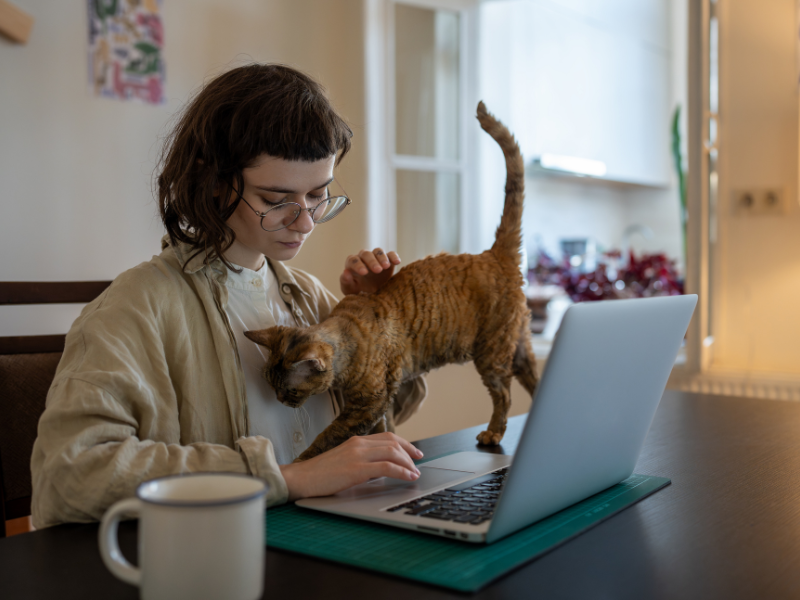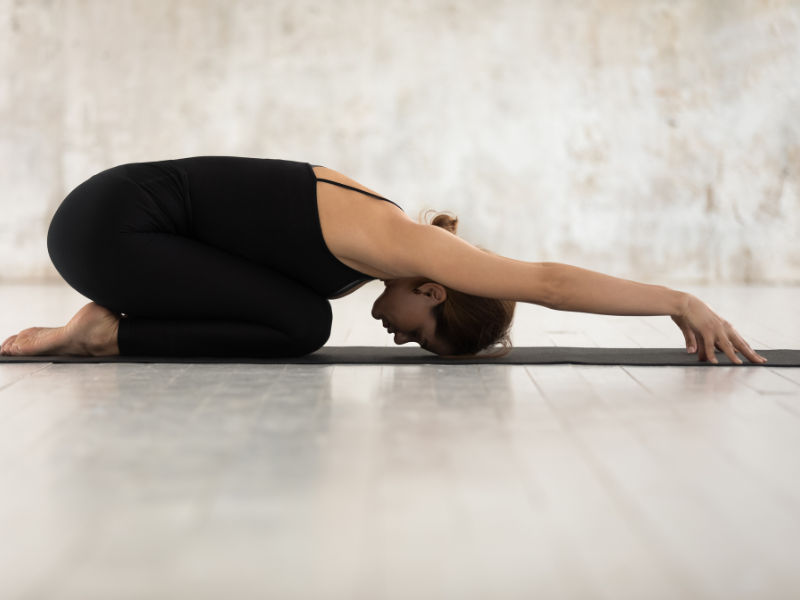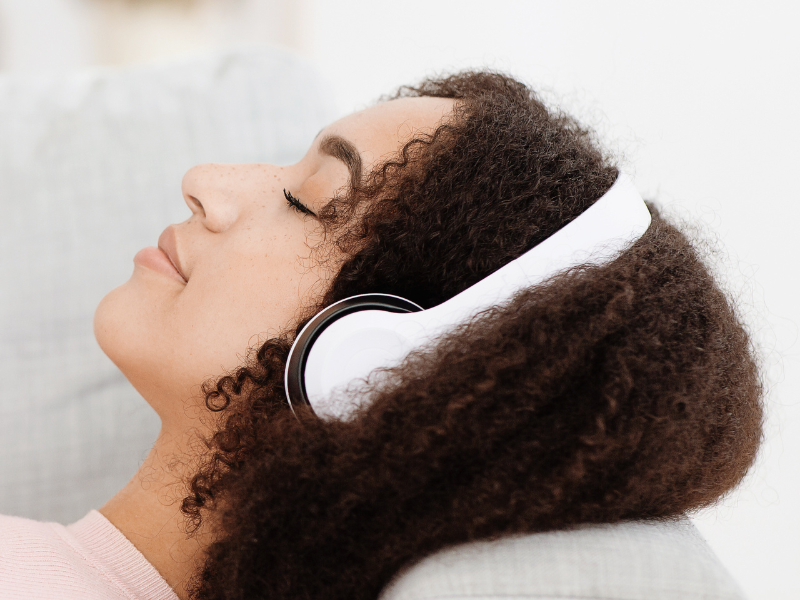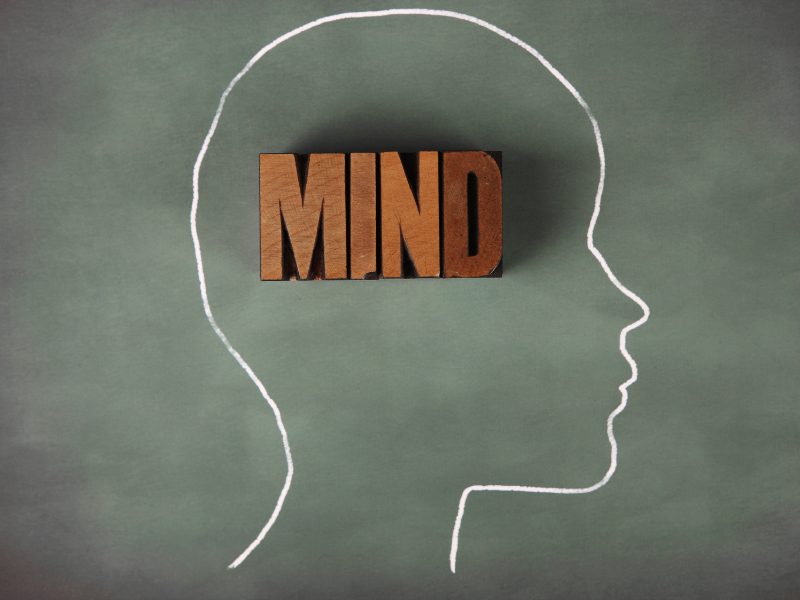


Feeling anxious, fast heartbeat, tremors, and chest pain are some of the symptoms you may experience during an anxiety attack. These overwhelming sensations can take a toll not only on your body but also on your mental health. So, how can you calm down anxiety in those moments?
It can seem scary and hard to manage. However, there are techniques that can relieve anxiety and help you to calm down in stressful situations like these. Keep reading to discover them.
Anxiety is one of the most common mental health conditions. It is connected to the feelings of fear and worrying about future events that have yet to happen.
It typically involves a mix of emotions, physical reactions, and behaviors to prepare you for things that you may perceive as dangerous [1].
Having some anxiety is normal and it is not necessarily a bad thing. However, when it starts to become overwhelming and frequent, it’s likely a signal that it could be something more serious like an anxiety disorder.
An anxiety attack occurs when the stress or fear starts to snowball until it becomes too overwhelming. It could feel like a sense of nervousness, irritability, fast heartbeat, rapid breathing, a sense of impending doom, difficulty concentrating or difficulty falling asleep.
The symptoms may last for a longer period of time. It could persist for days, weeks or even months depending on the severity of the condition [2].
Everyone experiences anxiety differently. This means that the cause of anxiety can also vary from one person to another.
However, social and environmental factors are common factors that contribute to the development of anxiety.
Some of the common social and environment factors are [3]:
See also: 6 Best Apps for Anxiety Relief
People often use anxiety attacks and panic attacks interchangeably, but in actual fact, they are not the same.
Panic attacks can occur with or without a trigger and the physical symptoms may show up unexpectedly. It is more intense and typically affects those with a panic disorder.
In contrast, anxiety attacks occur when there is a perceived threat and the symptoms build up gradually. Anxiety symptoms can range from mild to severe and it is a part of generalized anxiety disorder (GAD) [2].
So, if you are experiencing an anxiety attack or you sense that it is about to happen, here are 10 methods to help you get through it.
It’s normal to feel anxious from time to time. It happens and it’s a part of being human. Anxiety is our body’s fight-or-flight response that protects us from danger.
If you can’t fight it, why not accept it? Accepting anxiety as something that we all experience can help you to normalize the process and what it feels like. Additionally, acceptance can make you less fearful about future anxiety attacks [4].
Generally, during an anxiety attack, your breathing will start to speed up. It may feel as if you can’t breathe and you are slowly losing oxygen. When this happens, you may want to try a breathing technique such as deep breathing.
Deep breathing exercises can help to calm yourself down and slow your breathing and heart rate down. Try to focus on breathing deeply for at most 8 times per minute. Inhale for 4 seconds each time, hold your breath for 2-3 seconds, and then exhale for 4 seconds.

When you start to feel an anxiety attack coming on or you are experiencing one, distracting yourself can be a quick solution. Focusing on the anxious feelings often makes anxiety worse.
Taking your mind off what you are feeling can help to reduce symptoms or at least manage it better. Try out different methods such as counting backward from 100, counting to 1, reciting your favorite lyrics or poems, reading a book, or listening to music.
You can also try physical distractions, like squeezing a stress ball or going for a short walk. All of these distractions can take your focus away from the anxiety and ease the intensity.

When you’re dealing with anxiety, your body can stay tense for so long that you might forget what it truly feels like to be fully relaxed.
Progressive muscle relaxation is a technique that teaches you to relax your muscles and ease the tension. You can start this method by applying tension to a specific muscle group. Take slow, deep breaths and squeeze the muscles for about 5 seconds before quickly releasing.
Repeat this until you have contracted and relaxed all the muscles in the body.


Listening to music can be a good way to manage stress and calm yourself down. Music helps to lower your heart rate and cortisol levels and as well as increase positive emotions [5].
You can create a playlist filled with soothing soundtracks to listen to whenever you start to feel anxious. Alternatively, you may also get the ShutEye® app which has a variety of relaxing sounds from healing music, white noise to guided meditations.
Listening to music or white noise soundtracks can be a great way to manage anxiety. These calming sounds help drown out external distractions, allowing your mind to relax and shift focus away from anxious thoughts.
Sharing your feelings with loved ones can be a powerful way to calm anxiety. Opening up about your worries allows you to release pent-up emotions and gain support from those who care about you.
Your loved ones can also be the ones there to offer reassurance, help you feel understood, and remind you that you’re not facing your challenges alone, which can ease feelings of stress and anxiety.

You can also practice visualization by closing your eyes and imagining a place where you feel peaceful and relaxed, such as your home, your favorite tourist attraction, or the arms of your lover. Think about what you can see, hear, feel, smell or taste.
After thinking about this place, add details to the imagination, just like sprinkling seasoning on a cake, so that you will immerse in the imagination. You may also use positive affirmations such as “I am safe”, “I’m protected” or “I’m brave” to foster a sense of calmness and safety
This technique can help to ground you during an anxiety attack.
If you feel anxiety is coming to you, you might want to try journaling about it. Write down how you feel in that moment— your emotions, your thoughts and what is causing you to feel this way.
Penning down you feelings can help you to process negative thoughts easier and reframe them. It can help you to see things clearer and realize that what you are feeling is temporary and it will pass. This can make you feel much more at ease, reducing anxiety.

You may like this: Bullet Journal for Mental Health: 15+ Ideas to Use
Doing exercise can also be helpful in calming anxiety. It makes the body produce endorphins, which is a natural mood lifter, helping you to feel happier and more at ease.
You can either try brisk walking or light jogging outdoors to distract your mind from anxious thoughts. Otherwise, other exercises such as yoga or stretching are non-intense activities that can calm both your body and mind.

Try to avoid stimulants like coffee or alcohol as much as possible.
Coffee, energy drinks, and even some teas contain caffeine, which stimulates the nervous system and can worsen anxiety symptoms. Skipping caffeine can help to keep your energy levels stable and calm.
Alcohol can also cause you to feel uneasy and anxious as you get more intoxicated. It can also affect your ability to fall asleep and regulate your emotions properly.
Instead, opt for decaffeinated teas like chamomile or decaffeinated drinks to support a calmer state of mind.
You may also like:
8 Simple Ways to Manage Anxiety And Stress
Can You Get Anxiety From Lack of Sleep?
Calming intense anxiety down is possible with natural methods such as breathing exercises, visualization techniques, journaling, exercising and more. However, if you do suffer from overwhelming anxiety, it could be a sign of panic disorder or generalized anxiety disorder (GAD). You might want to see a mental health professional for proper treatment.
Discover ways to reduce anxiety-related sleep disturbances and start sleeping peacefully with the ShutEye® app. ShutEye® is an all-in-one sleep app that tracks your sleep cycle, and offers sleep sounds and personalized sleep tips.
Chand SP, Marwaha R. Anxiety. [Updated 2023 Apr 24]. In: StatPearls [Internet]. Treasure Island (FL): StatPearls Publishing; 2024 Jan-. Available from: https://www.ncbi.nlm.nih.gov/books/NBK470361/
de Witte, M., da Silva Pinho, A., Stams, G.J., Moonen, X., Bos, A.E.R. & van Hooren, S. (2020) 'Music therapy for stress reduction: a systematic review and meta-analysis', Health Psychology Review, 14(1), pp. 134-159. Available at: https://doi.org/10.1080/17437199.2020.1846580
Leonard, J. (2023) How do you know if you're having a panic or anxiety attack? [online]. Available at: https://www.medicalnewstoday.com/articles/321798
Marie, S. (2022) The Importance of Accepting Anxiety [online]. Available at: https://psychcentral.com/anxiety/accepting-and-overcoming-anxiety
Mental Health Foundation (n.d.) What causes anxiety? [online]. Available at: https://www.mentalhealth.org.uk/our-work/public-engagement/mental-health-awareness-week/anxiety-report/what-causes-anxiety